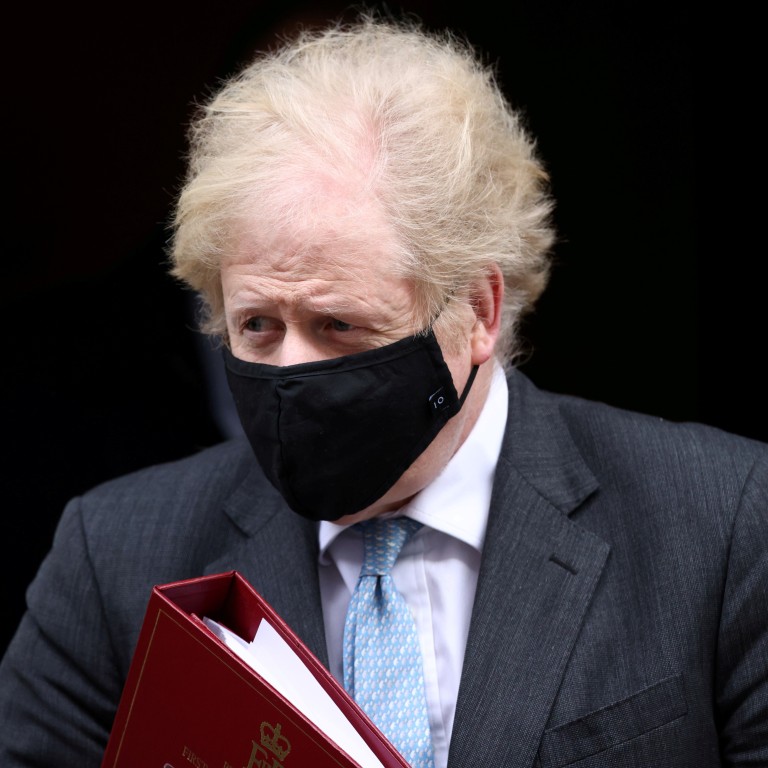
Coronavirus: Britain’s Boris Johnson to host virtual G7 meeting to push for global vaccine roll-out
- Johnson will call for the G7 to work on a global approach to pandemics, such as designing an early warning system
- The UN Security Council will on Wednesday debate the problem of global access to Covid-19 vaccines
British Prime Minister Boris Johnson will host a virtual meeting of G7 leaders on Friday to call for action to ensure equal global distribution of Covid-19 vaccines, and to prevent future pandemics, Johnson’s office said.
The meeting of the leaders from the Group of Seven rich nations will be the first since April last year, and will be Joe Biden’s first major multilateral engagement as US president, Downing Street said.
“The solutions to the challenges we face – from the colossal mission to get vaccines to every single country, to the fight to reverse the damage done to our ecosystems and lead a sustainable recovery from coronavirus – lie in the discussions we have with our friends and partners around the world,” Johnson said.
Quest for mutant-quelling jabs begins as new virus strains run rampant
Johnson will call for the G7 to work on a global approach to pandemics, such as designing an early warning system, which would bring to an end “the nationalist and divisive politics that marred the initial response to coronavirus”, his office said.
The World Health Organization has warned that a “me-first” policy towards vaccines by rich nations could leave the poorest and most vulnerable at risk, while also allowing a situation in which the virus could continue to spread and mutate.
Britain itself has been caught up in a row between the European Union and Anglo-Swedish drug maker AstraZeneca over vaccine supplies, which almost led to the bloc imposing emergency measures to prevent exports of shots into the United Kingdom via Northern Ireland.
“Quantum leaps in science have given us the vaccines we need to end this pandemic for good,” Johnson said in a statement. “Now world governments have a responsibility to work together to put those vaccines to the best possible use.”
In June, Johnson is due to host the first in-person summit of G7 leaders in nearly two years in a seaside village in Cornwall, southwestern England, which will focus on rebuilding from the pandemic and climate change, a top priority for Britain ahead of the COP26 conference it is due to host in November.
UN DEBATE
Meanwhile, at the initiative of Britain, the UN Security Council on Wednesday will debate the problem of global access to Covid-19 vaccines, raising issues likely to underscore sharp differences between council members.
How, for example, can vaccines be distributed fairly – without, as has been the case, going first to the richest countries in the North while those in the South suffer? Should blue-helmeted UN peacekeeping troops in some 15 countries, along with other UN employees deployed around the world, be declared essential workers and receive vaccine priority – including in countries yet to receive vaccine doses? If so, who should provide the jabs – the United Nations, the troops’ countries of origin or those where they are deployed?
“Vaccine, vaccination is not really the job of the Security Council,” said one ambassador, speaking on grounds of anonymity.
Coronavirus: all origin theories still on the table, WHO chief says
The Security Council, with a mission of maintaining peace and security around the world, has no special health expertise, the ambassador noted, adding, “the Security Council can just have a contribution.” He added that no resolution on the matter is likely to come this week.
The Security Council’s only direct involvement in the pandemic came in July 2020 when, after long and difficult negotiations to resolve sharp US-Chinese tensions, it passed a resolution encouraging ceasefires in countries in conflict to limit the spread of Covid-19.
Britain recently shared with a few other countries a draft resolution on vaccine management, diplomats said.
“There is a draft resolution,” one said. “The negotiations have just started. It will take some time.”
Vaccination “is the big challenge now,” said Olof Skoog, the European Union ambassador to the council. “A long way to go before people are fully vaccinated.”
Skoog, who is Swedish, noted that the EU has contributed to creating the global Covax Facility initiative which, under UN auspices, aims to provide at least two billion doses by the end of the year, including at least 1.3 billion doses to 92 lower-income countries.
“What we don’t want to see is a kind of vaccine apartheid,” with rich Northern countries receiving ample supplies and poorer Southern countries – as South Africa recently warned – going without, said the ambassador speaking anonymously.
He said negotiations over a Security Council resolution were likely to be “complicated,” with some countries uncomfortable at the “transparency” involved in committing themselves to leave no country wanting for vaccine.
More China Covid-19 vaccines out for delivery as world scrambles for shots
Several countries, including China, Russia and some Gulf nations, have already launched “vaccine diplomacy” initiatives, either showcasing their own production capacity or providing easier access to vaccine doses.
UN Secretary-General Antonio Guterres has repeatedly sounded a warning that as the virus and its multiple variants spread around the world, global security can be assured only if everyone enjoys the same level of protection.
He has repeatedly called for vaccines to be treated as a “global public good,” without specifying exactly how that might happen.
Poorer countries are seeking their own coronavirus vaccines
Asked recently about the eventual UN role in establishing a sort of counterfeit-proof “vaccination certificate,” UN spokesman Stephane Dujarric said that “there needs to be international coordination and standardisation of these things moving forward.”
Also of concern, he added, “is the criminal element of people falsifying vaccine certificates or, even worse, giving people false … vaccines that are not actual vaccines.
“So, I think the more international cooperation we can get on this, the better it is.”

